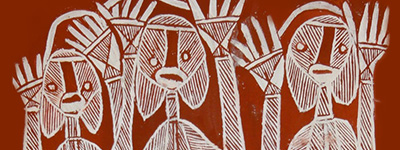Bininj Kunwok
Triangular Kinship Terms

djongok
|
Audio |
|
|---|---|
|
Word Stem |
djongok |
|
Etymology |
Ordinary kin term for one's "poison cousin" MMBC. |
Definitions |
|
|
#1 |
djongok you are my child (female ego), my doydoyh ‘FFM(B), MMM(B) etc’, your mawah ‘FF(B/Z)’. It is not clear how this term refers to a djongok (which is a synonym for na-kurrng/ngal-kurrng). If it is egocentric, then one’s doydoyh is not one’s djongok, but would be married to one’s doydoy. It cannot be tucentric because the hearer calls the referent mawah. I know of no superclass that collapses mawah/sibling with a djongok, so it must be egocentric. |
|
#2 |
djongok you are my child (female ego), my skewed F or FZ (FZC>F(Z), MBC>F(Z), your djongok/na-kurrng ‘MMBS’. Reciprocal term = djongok |
|
#3 |
djongok you are my child (female ego), my skewed F or FZ (FZC>F(Z), MBC>F(Z), your djongok/na-kurrng ‘MMBS’. Reciprocal term = djongok |
|
#4 |
djongok you are my husband, my classificatory mother-in-law (if a woman) or na-kurrng ‘MMBS’ (if a man), your doydoy (FFM(B), MMM(B)). Reciprocal term = doydoyh. |
|
#5 |
djongok you are my husband, my classificatory mother-in-law (if a woman) or na-kurrng ‘MMBS’ (if a man), your doydoy (FFM(B), MMM(B)). Reciprocal term = doydoyh. |
|
#6 |
djongok you are my husband, my mother-in-law, your mother. Reciprocal term = karrard |
|
#7 |
djongok you are my kangkinj ‘ZC’, my MF, your djongok ‘MMF’. Reciprocal term = djongok. |
|
#8 |
djongok you are my mother, my djongok/ngalkurrng ‘MFM(B)’, your makkah ‘FM(B)’. Reciprocal term = djongok/ngalkurrng |
|
#9 |
djongok you are my ZDS, my na-kurrng ‘MMBS etc’, your father. Note that if the term used is djongok, the centricity is egocentric, but if the term chosen is na-babba, then this is tucentric |
|
#10 |
djongok you are my child (female ego), my makkah ‘FM(B)’, your djongok/ngal-kurrng. Reciprocal term = djongok/ngalkurrng. |
|
#11 |
You are my husband, my mother-in-law, your mother.
|
|
#12 |
You are my husband, my classificatory mother-in-law (if a woman) or na-kurrng ‘poison cousin’ (if a man), your doydoy ‘FFM(B), MMM(B)‘. Alternative terms are speaker 1 says na-rroyngu and speaker 2 replies with the reciprocal term na-ngarrkkang.
|